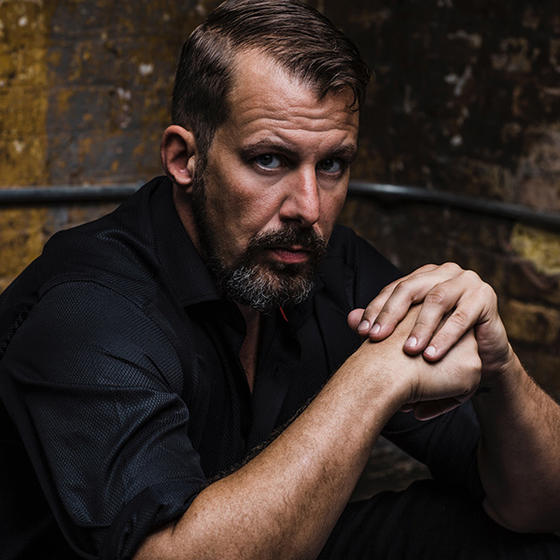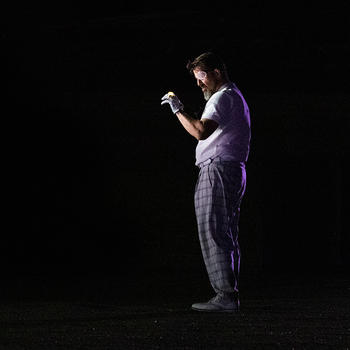Baritone Kyle Albertson once performed the role of the charismatic, one-eyed king of the gods Wotan in Wagner’s iconic (eye-conic?) The Valkyrie with only six hours notice for a Dallas Symphony Orchestra concert. After catching a flight and being whisked to the venue a mere seven minutes before Act Two and Wotan’s first entrance, Albertson gave a stellar performance that earned him rave reviews; The Dallas News called the debut “gripping…so emotionally intense…this high-intensity performance will surely rank as a legend in Dallas musical history."

Now Center for the Arts audiences have the chance to see him return to the role in the Virginia Opera’s production of The Valkyrie this October 8 and 9. Albertson chatted with Center for the Arts intern Callie Cooper—who is completing a master’s degree in vocal performance herself—discussing everything from fate to first-time opera goers…
C: How did you get into opera?
A: I kind of fell into it to be honest, growing up I wasn’t really exposed to opera in any way, we didn’t listen on the radio or anything of that nature. My parents weren’t exposed to it as kids, so I wasn’t. But I had a good voice and I went to college to become a high school choir director. I had a voice teacher who exposed me to opera and said, you know, you could possibly make a living at this. And basically fell into it from there. I saw my first opera at The Metropolitan Opera and it just blew my mind, the spectacle of it all, the voices.
C: You’ve been in a couple other productions with Virginia Opera, are there any other companies in the country that do a tour like they do?

A: Not that I’ve worked for, Virginia is one of the few that makes sure the opera gets to all different parts of the state (Norfolk, Fairfax, and Richmond)! Last year I did Das Rheingold at Topgolf, so there wasn’t that much traveling involved in that since it was created specifically for an outdoor Topgolf in Norfolk.
But when I did Scarpia in Tosca, that was my first exposure to the tour. It kept you on your toes in a good way. It was always interesting to see the audiences' reactions from the different cities as well. Very unique, I believe.
C: The Ring Cycle is typically performed in full over a couple of months; how does it feel to sing Wotan a year apart?
A: Last year we started our Cycle with Das Rheingold at Topgolf. It was an idea that was conceived out of necessity to keep everyone safe from COVID. That being said, it was a success, we were able to put a production on there. That being said, it was hot. Outdoors in September in Virginia...
It’s great to do Wotan a year apart...it’s great. Number one there are a lot of German words in both these pieces, so having the ability to focus on one at a time—it's been a blessing. And also to have the time this whole year to process the evolution of Wotan from the first to the second one and really get to understand the character more and the shows in depth has been fantastic. I am really looking forward to getting back to Virginia.
C: What's your favorite thing about the Jonathan Dove adaptation?
A: It’s shorter! Wagner’s operas are just monumentally long—that is just a lot to ask of an audience. This evening will run under three hours, which is a normal opera length. It keeps the core of the story, Wagner’s cosmos is there. There is a lighter orchestration as well, which makes my job as a singer a little easier as well.
C: So do you think this would be a good first introduction to Wagner?
A: Absolutely! This, number one, has the most recognizable tune in opera: “Ride of the Valkyries.” The story is just so cool, it is just a wackadoodle story and ride. I can’t believe Hollywood hasn’t put this on the big screen to be honest. It's just fantastic. The music itself is mind-blowingly gorgeous, it doesn’t matter if you’ve heard it before or this is the first time you are hearing it; it just really takes you over. It’s what Wagner does to audiences, his music is so rich and enveloping. And tells a story without having to use words, I think that really helps the audience feel the emotions that the actors are putting on the stage.
C: I don’t want anyone to be scared of this opera because it is Wagner, its long, it’s in German...
A: Yeah, I don’t want to dismiss that because those are valid concerns. But listen, I’m from Iowa—I didn’t understand any of this at all. Number one, they put the subtitles, number two, the music is going to tell you anyway. You will enjoy it, give it a chance.
C: What was your first exposure to the Ring?
A: It was at Minnesota Opera, after I was a Young Artist there, I was brought back for a Rheingold there where I sang Donner and covered Wotan for the first time. That was my first performance exposure. My first time hearing it would probably be “Ride of the Valkyries” in Apocalypse Now.
C: Not Looney Tunes?
A: Well now that you mention it, it was Looney Tunes. Ha! I forgot about that!
C: What would you like audiences to know about your character or the opera?
A: Wotan himself is Oden in Norse mythology, he has one eye, he is powerful, he is quick to anger. The main driving force behind Wotan in the whole Ring, but particularly Valkyrie, is him trying to control fate. He wants to preserve himself and his fellow gods, he wants to make them safe. That’s what he is trying to do the entire Ring Cycle. He maneuvers around fate; he tries and tries—ultimately fails. I guess that’s the moral of the story: fate is what it is. It’s a struggle that humans face today, not on an epic scale. Fate versus free will is still something philosophers still haven’t decided on.
C: What is your favorite opera in the cycle?
A: The Valkyrie, just because the music in it is just so stunning. it's really a cliff hanger. So be wary if you are an audience member—it will suck you in and you will have to see the next one!
C: What's your favorite opera in general?
A: I can’t do favorites. I love Tosca, Candide, Valkyrie, Don Giovanni. I can’t one and done.
C: What's a role you want to do in the future?
A: Mephistopheles in Faust. Playing the bad guy is fun. I have never done a Figaro, and I would really like to.
C: Is there anything else that you would like our audiences to know?
A: Give it a chance, you won’t regret it. Get out there and get the tickets.
The Valkyrie (Oct. 8 and 9) kicks off Virginia Opera’s four productions at the Center for the Arts this season. You can subscribe to all four operas (including Pirates of Penzance, Fellow Travelers, and La Traviata) to save 20%, or choose from three or more events across the Great Performances at Mason 2022/2023 season and save 15%.
Until then, listen to Kyle Albertson perform the “Te Deum” from Tosca in an Augmented Reality created by the Phoenicia Festival of the Voice.
